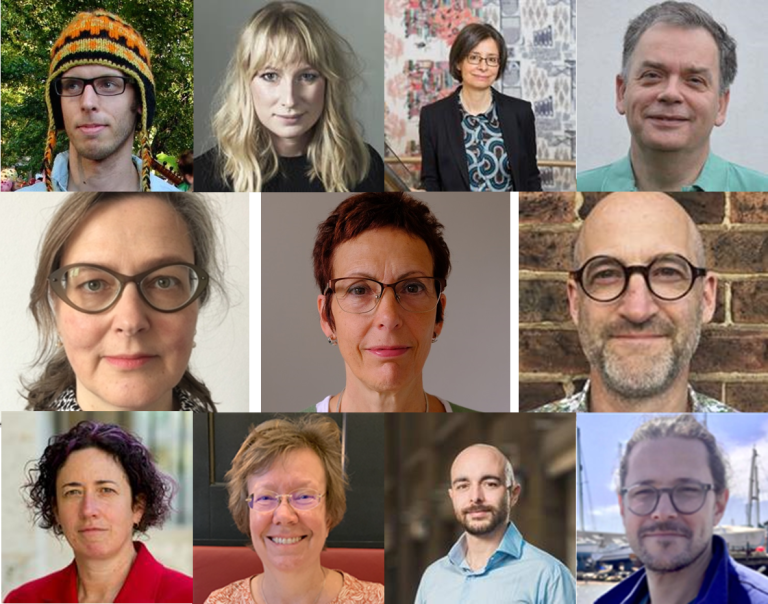Engineering biology projects at UCL boosted by UKRI funding
14 February 2024
UCL scientists will be leveraging engineering biology to tackle global challenges such as preventing plastic pollution and improving metal recovery and recycling, in new collaborative projects funded by the UK Research and Innovation (UKRI).

The Engineering Biology Mission Hubs and Awards, announced by the UKRI as a £100m investment, aim to harness cutting-edge engineering biology research from across the UK to address global challenges from health to the environment.
The six hubs, two of which feature UCL academics, will receive up to £12 million each from the UKRI Technology Missions Fund and the Biotechnology and Biological Sciences Research Council (BBSRC).
Mission Hub: Preventing plastic pollution with engineering biology
This Mission Hub aims to tackle the urgent environmental challenge of plastic pollution and create new ways for the sustainable deconstruction of synthetic plastics as the UK transitions towards a circular plastics economy.
The hub will be led by Professor Andrew Pickford (University of Portsmouth), with support from scientists from seven leading UK institutions, including UCL co-investigators: Professor Helen Hailes (UCL Chemistry), Dr Jack Jeffries (UCL Biochemical Engineering), Professor Mark Miodownik (UCL Mechanical Engineering), Professor Paola Lettieri (UCL Chemical Engineering), Dr Andrea Paulillo (UCL Chemical Engineering), Dr Brooks Paige (UCL Centre for Artificial Intelligence), Professor Christine Orengo (UCL Biosciences).
Over the next five years, the Mission Hub will develop impactful engineering biology platforms that will enhance the performance of enzymes and microbes for the deconstruction of a wide range of plastics.
Building on previous research from the Plastic Waste Hub at UCL, the project will also develop innovative and environmentally friendly ways to create high-value products from waste.
Mission Hub: Engineering biology hub for environmental processing and recovery of metals; from contaminated land to industrial biotechnology in a circular economy (The ELEMENTAL project)
This mission hub aims to address the growing need for critical minerals, such as cobalt, lithium and indium, in clean energy technologies and to promote a circular economy whereby these earth elements can be recycled.
The hub will be led by Professor Martin Warren (University of Kent), with support from academics including Dr Brenda Parker (UCL Biochemical Engineering), Professor Julia Stegemann (UCL Civil, Environmental and Geomatic Engineering) and Professor Joanne Santini (UCL Biosciences).
The cross-institutional ELEMENTAL project aims to establish an open knowledge hub that will collaborate with ongoing projects related to mineral extraction, urban mining, industrial waste, and nuclear waste by leveraging engineering biology tools and approaches.
The project will also explore the potential of phytomining, where certain plants naturally accumulate metals and rare earth elements from the soil.
Alongside the hubs, a series of Mission Awards will fund projects for two years and receive a share of £30 million in funding.
Mission Award: A powerful directed evolution tool for exploitation of chloropast engineering biology.
Professor Saul Purton (UCL Biosciences) will lead this Mission Award that will explore the exploitation of chloroplasts – the energy-producing sites of photosynthesis in plant and algae cells – in engineering biology research supporting clean growth.
Professor Geraint Rees (UCL Vice-Provost, Research, Innovation and Global Engagement) said:
““Cross-disciplinary collaboration is vital to addressing the global challenges we face and the Engineering Biology projects show the impact science can have when academic and industrial partners come together. I would like to offer my congratulations to the exemplary UCL researchers who have received funding, and look forward to seeing the results of their innovative research.”
Dr Kedar Pandya, UKRI Executive Director, Cross-Council Programmes at the Engineering and Physical Sciences Research Council said:
“ ““Engineering Biology is one of the critical technologies for the UK strength and opportunity identified in the Innovation Strategy. It has the potential to change many aspects of our lives, from how we grow our food, to developing new medical treatments, and on through to clean growth that will develop more environmentally sustainable manufacturing processes and supply chains, as well improved diagnosis of, and cures for, environmental issues.”
Links
- Dr Brenda Parker's academic profile
- Professor Joanne Santini's academic profile
- Professor Mark Miodownik's academic profile
- Professor Helen Hailes' academic profile
- Dr Jack Jeffries' academic profile
- Professor Paola Lettieri's academic profile
- Dr Brooks Paige's academic profile
- Professor Christine Orengo's academic profile
- Professor Saul Purton's academic profile
- Dr Andrea Paulillo's academic profile
- Professor Julia Stegemann's academic profile
- UK Research and Innovation
- UCL Faculty of Engineering Sciences
- UCL Faculty of Life Sciences
- UCL Faculty of Mathematical & Physical Sciences
 Close
Close

